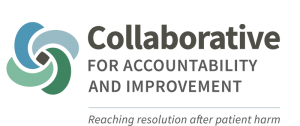A Communication and Resolution Program (CRP) is an emerging best practice for addressing patient harm.
When something goes wrong during healthcare, the best response is timely and compassionate, and promotes healing for all involved. CRPs guide this response, seeking to meet the current and future needs of patients and families through transparent and ongoing communication about what went wrong and an exploration of what will lead to resolution and healing. CRPs promote healing and diminish provider trauma and burnout by proactively offering support following an unintended harm event. Increasingly viewed as the future of healthcare, CRPs are integral to improving patient safety and preventing unintended harm, and are endorsed and adopted by leading national organizations and health systems.
The Collaborative for Accountability and Improvement: A Program of UW Medicine is dedicated to accelerating the spread of effective CRPs to healthcare organizations everywhere. The Collaborative brings together CRP innovators and respected experts in healthcare, law, and patient advocacy to support effective implementation and ongoing improvement of CRPs through training, shared learning, and advocacy.
The Collaborative for Accountability and Improvement is also a founding member of the Pathway to Accountability, Compassion, and Transparency (PACT), a learning community committed to improving the way healthcare organizations respond to and learn from harm events. PACT seeks to ensure that every healthcare organization has a comprehensive, highly reliable CRP in place for responding when patients are harmed by their care. To learn more about PACT and how your organization can get involved, visit https://www.ariadnelabs.org/pact/.

